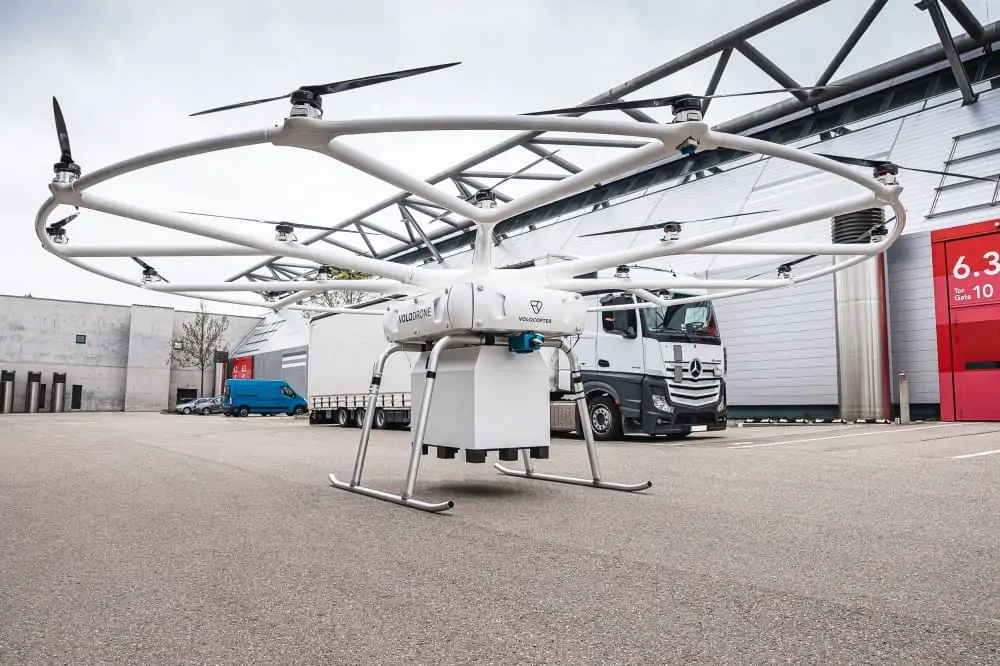


Near Earth Autonomy’s autonomous flight technology is being tested on an electric vertical take-off and landing (eVTOL) unmanned aerial vehicle (UAV) developed by Volocopter. The combined expertise of the two companies will be used to further autonomous urban air mobility (UAM), culminating in a planned Beyond Visual Line of Sight (BVLOS) capability demonstration in Munich in 2022.
Volocopter has undertaken ten years of eVTOL flight testing experience with over 1,000 flight tests, and its VoloDrone platform is designed to safely transport cargo where conventional ground-based transport is limited due to factors such as topography, regulation or heavy traffic. Near Earth Autonomy has conducted 3,500 flights, lasting over 2,000 flight hours, with its autonomy system across various aircraft types, sizes, and environments. The partnership between the two companies aims to establish standardized BVLOS capabilities within the business-to-business transport sector.
Volocopter is currently preparing for commercial launch of UAM services, which are planned to function within a UAM ecosystem to promote greater connectivity in congested urban areas with sustainable, aerial solutions. This ecosystem will be composed of electric air taxis (VoloCity and VoloConnect), electric heavy-lift drones (VoloDrone), their respective infrastructures (VoloPort), and a digital connective platform (VoloIQ).
Near Earth has already integrated its BVLOS autonomy systems with full-scale helicopters, both in piloted and remotely piloted configurations. Together with Volocopter, it will adapt its autonomy technology to seamlessly integrate with the overall eVTOL architecture while addressing the challenges of weight, power, and cost. To start, the partners will utilize subscale testbeds equipped with Near Earth Autonomy’s technology and Volocopter’s control systems to test the BVLOS capabilities in a controlled environment.
After adapting and testing the BVLOS capabilities on subscale platform to leverage the Volocopter specific flight characteristics, the same technology will be used on the full-sized VoloDrone to prepare for fully autonomous flight for future logistics use. The VoloDrone, Volocopter’s electric heavy-weight cargo drone, can carry a 200 kg payload over distances of up to 40 km and will add a decisive edge in sustainable business-to-business transport over difficult terrain. BVLOS capabilities would help VoloDrones achieve autonomous aerial cargo transport.
Christophe Hommet, Volocopter’s Chief Engineer on VoloDrone, commented: “We are very excited to work together with the leading player in the aerial autonomy industry. Near Earth Autonomy has years of experience, shown real results, and is going to help our VoloDrone stay ahead of the curve with autonomous capabilities.”
Sanjiv Singh, CEO of Near Earth Autonomy, said: “Volocopter’s track record, unique safety design, and vision have established it as the leader in the eVTOL industry. We look forward to proving autonomy systems for their aircraft. Our shared vision of the future, and safety as an integral part of it, makes this an ideal partnership.”





Related Posts
Skyeton Integrates Radiation Surveillance Sensors into Raybird UAS Expands Mission
Schiebel to Establish Dedicated UK Entity Expand Defence Operations
Alpha Unmanned Parallel Flight Partnership Targets Long-Endurance Heavy-Lift UAV Operations